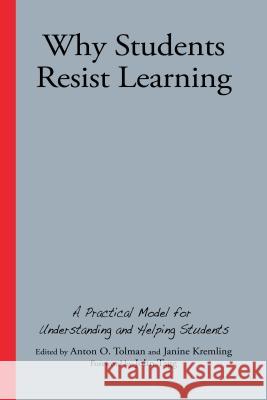Why Students Resist Learning: A Practical Model for Understanding and Helping Students » książka
Why Students Resist Learning: A Practical Model for Understanding and Helping Students
ISBN-13: 9781620363430 / Angielski / Twarda / 2016 / 296 str.
Why Students Resist Learning: A Practical Model for Understanding and Helping Students
ISBN-13: 9781620363430 / Angielski / Twarda / 2016 / 296 str.
(netto: 721,53 VAT: 5%)
Najniższa cena z 30 dni: 654,86
ok. 16-18 dni roboczych.
Darmowa dostawa!
However personally committed faculty may be to helping students learn, their students are not always as eager to participate in this endeavor, and may react with both active and passive resistant behaviors, including poor faculty evaluations.
The purpose of this book is to help faculty develop a coherent and integrated understanding of the various causes of student resistance to learning, providing them with a rationale for responding constructively, and enabling them to create conditions conducive to implementing effective learning strategies.
In this book readers will discover an innovative integrated model that accounts for student behaviors and creates a foundation for intentional and informed discussion, evaluation, and the development of effective counter strategies. The model takes into account institutional context, environmental forces, students' prior negative classroom experiences, their cognitive development, readiness to change, and metacognition. The various chapters take the reader through the model's elements, exploring their practical implications for teaching, whether relating to course design, assessments, assignments, or interactions with students.
The book includes a chapter written entirely by students, offering their insights into the causes of resistance, and their reflections on how participating on this project has affected them.
While of great value for faculty, this book is also useful to faculty developers advising future and current faculty, as well as to administrators, offering insight into how institutional values impact teaching practice and student attitudes.











